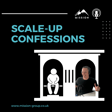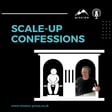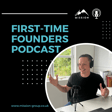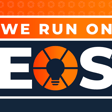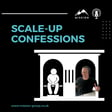Become a Creator today!Start creating today - Share your story with the world!
Start for free
00:00:00
00:00:01

The personal scorecard - how to ensure your your belt size doesn't grow in line with your business!
In this episode of the First-time Founders Podcast, Rob walks listeners through the personal and business scorecards he uses to keep his life on track despite the uncertainty of the entrepreneurial journey.
Interested listeners can reach Rob (https://www.linkedin.com/in/robertliddiard/) at Rob@mission-group.co.uk (or to book some free time, visit https://www.eosworldwide.com/rob-liddiard). Alternatively, if you'd prefer Rob to send you a free copy of Traction (the book by Gino Wickman which explains The Entrepreneurial Operating System) just complete the form here: https://www.eosworldwide.com/traction-giveaway?implementer_email=rob.liddiard@eosworldwide.com
Transcript
Introduction to Rob Lydiard and First Time Founders Podcast
00:00:00
Speaker
Hello, welcome to the First Time Founders Podcast, the show where we talk about how to start a business for nothing and grow it into something meaningful. I'm Rob Lydiard. I was the founding CEO of a software business called Yapster that was acquired in 2022. And I'm now a professional implementer of the Entrepreneurial Operating System, or EOS, which means I work with entrepreneurs and entrepreneurial leadership teams to help them get what they want from their businesses.
00:00:25
Speaker
Today I'm doing another solo episode where I'm talking to you about something that's very dear to my heart, this the subject of a scorecard. Now I've spoken not too long ago about the scorecard in the business context, so today I'm going to talk mainly about the scorecards from a personal perspective as a founder.
00:00:42
Speaker
Most of us embark on journeys of entrepreneurship because we have some sort of vision either loosely or specifically held for our lives as people, as mothers and fathers, whatever. But just as human beings, like we get some sort of deep personal or we expect to get some deep personal fulfillment for pursuing a life of independence and entrepreneurship.
Entrepreneurship Uncertainty and the Scorecard
00:01:06
Speaker
The thing is, it's an inherently uncertain journey.
00:01:09
Speaker
which is a theme that comes up again and again on the First Time Founders podcast. And so the scorecard is a tool that I use, and all of my friends in the entrepreneurial operating system community should be using, to stay anchored to the things that matter week for week in pursuit of your dream, your vision, even when the wind's blowing a gust left, right, or God forbid, even straight in your face.
Vision Planning: 10-Year, 3-Year, and 1-Year Goals
00:01:31
Speaker
So let's get into talking about it.
00:01:33
Speaker
Right, so first some context for my scorecard. So my 10 year vision, don't laugh, it's supposed to be bold, but just about achievable, is I want to generate a million quid a month in profit, ideally cashflow, but profit from businesses that I own solely or in partnership with others. So how the hell am I going to get there?
00:01:57
Speaker
What we do is we work down from our 10-year target and we set a three-year picture. So in my three-year picture, I need to have acquired my first business no matter how small. It's probably going to be a B2B tech or services business because that's my background. That's where I'm passionate and specialize and spend most of my time working now. So in three years, at the end of 2027,
00:02:19
Speaker
That's what I need to have done. I need to have made my first micro acquisition no matter how house small. Then that gives me another seven years to continue to grow, compound and acquire further businesses until I get to a place where cumulatively those businesses are turning over probably.
00:02:36
Speaker
somewhere between 30 and 40 million in revenue in order to get to that kind of 12 profit number.
Weekly Meetings and Tracking Progress with Scorecards
00:02:44
Speaker
Now, I'm not a hugely monomotivated person, but in entrepreneurship at the end of the day, the scorecard of success is often numerical, whether we like it or not. And I definitely in my earlier stages of my entrepreneurial career have been guilty of being a bit too flaky around the hard numbers. So I've learned my lesson on that.
00:03:02
Speaker
It's not because I've got any chance in hell of spending that sort of money. It's just, it's a picture roughly of the sort of size of operation I'd like to to lead and manage using the entrepreneurial operating system. Right. So I've got to, I've got to have acquired a small business in three years and then in one year, so by the end of 2024,
00:03:22
Speaker
I just need to have built a sustainable, thriving EOS practice where I'm working with entrepreneurial teams that I love to be around. um I'm not dipping into the capital that I i made at the the end of the Appster journey. And I'm beginning to accumulate some a bit of a war chest that my wife's not going to be upset if I gamble on semi-speculative acquisitions. So that's basically it, right? Within the next year, I'm trying to build a really thriving EOS practice where I'm creating more value for the entrepreneurs in my life that I'm taking.
00:03:52
Speaker
But the share that I am taking has enabled me to to live comfortably without dipping into capital and begin to build some some reserves from which to make my first acquisition by the end of 2027. So hopefully that's clear in terms of a broad picture for my life um using the US framework.
00:04:11
Speaker
So now that gets broken down into a series of quarters. We call them rocks in the US, as you know. And I won't i won't go into what my specific rocks are. It's not that relevant for the purposes of talking about the scorecard. But every week, I do a level 10 meeting with Sharon, the practice manager that I work with. And we talk about whether our rocks are on track or not. And we've got revenue, and profit and measurable sort of goals for the quarter.
00:04:34
Speaker
um and our rocks. and And so if I'm on track with those rocks, then we're in a good place. If Sharon's on track with her rocks, we're on a good place. And we also do a scorecard review.
Integrating Business and Personal Goals into Scorecards
00:04:44
Speaker
And the scorecard, if you remember from from EOS, um if you don't, don't worry, I'll explain it now, is a really simple one page sheet of numbers. It starts with the name of um the person that's going to be accountable for a given number. Then we move on to a measurable. That's the thing that's being measured, the number that the person, the owner is responsible for.
00:05:04
Speaker
And we have a goal for the week. So a lot of entrepreneurs struggle with coming up with weekly goals because they're like, well, our business runs on monthly cycles. Well, that's fine. You can have monthly numbers, but just not in your scorecard. Your scorecard is about holding yourself accountable week for week. And then what you have is you just capture how you ended last week, every week. And you have a 13 week rolling view up on the screen. So you can see in green or red, whether you've been on track or off track for the most important numbers, typically five to 15 numbers in your business.
00:05:34
Speaker
over recent weeks. So now I'll talk you through my scorecard, and there's two elements to my scorecard. There's the business elements of the scorecard, which is what we teach in EOS, because EOS is a business operating system. It's designed to give you sort of personal satisfaction through delivery of your business objectives, working in ah you know in a healthy way.
00:05:54
Speaker
But I've also um amended mine, extended mine to include some personal measurables, because ultimately, my business objectives at this stage in my life is about having a great life broadly
Maintaining Relationships and Giving Value First
00:06:04
Speaker
defined. So let me talk you through what's on my scorecard. OK, so let's talk about the business measurables first. So I have ah two measurables that I'm directly responsible for, and then Sharon has another five that she's responsible for. So of course, Sharon's seat reports to my seat, so I'm indirectly responsible for for a number of these, but directly responsible for a couple. So the first is I try and publish publish one of these podcasts every week. I also try to publish a piece of content to LinkedIn five days a week, so five out of seven, and once every business day on average. Piece of content that's hopefully helpful and relevant to my target market, which is entrepreneurs and entrepreneurial leadership teams, primarily in the B2B software and services space, but I don't discriminate from a content perspective.
00:06:55
Speaker
So those are my two measurables, and I'll give some context as to why they're my measurables in a moment. Then moving on to some of Sharon's measurables. So Sharon's first measurable is the percentage of prospect and connector next steps that are set, with the goal being 100%. So we have a list of our key relationships, key professional relationships. These might be teams that we work with, founders, partners that we collaborate with, folks um whom it's really important of that I have a healthy, vibrant, win-win relationship with. Now, what I've found is I can be a bit ah bit chaotic, and um if I don't take control of my calendar, I can accidentally do things that that run contrary to my strategy for my life. And spending time with the fellow professionals that I love, where I can help them and they can also help me on my mission, is something that I don't want to fall off mine to do.
00:07:45
Speaker
So Sharon's Measurable is about making sure that that list of 20 or so people, we always know what we're doing that adds value to their life and when we're seeing them next. Could be six months forward, but we always have to know and that has to be in the calendar. The goal is 100% of those people. The next thing that we do is we try to do um One of the the key principles of the EOS model is you always give value first. So we always do a free workshop where we introduce the entrepreneurial operating system. So I'll go and do ah like a workshop with a founder and and his or her leadership team. And we try and schedule two of those
Financial Stability and Stress-Free Sales Approach
00:08:18
Speaker
every week, not necessarily for that week, at some point over the you know the coming period. And if we're always putting two new ones in the calendar, then we know we're never going to run out of workshops.
00:08:28
Speaker
And we also try, at the moment, to sit two workshops a week. So in addition to helping Sona, the company that acquired Yapster, I knew a contract with with with those guys, and doing client sessions for leadership teams I'm already working with in EOS, I'm looking to allocate my time that's not sort of fun time, personal time, to doing these workshops to meet new people and spread the gospel of EOS. I want to do two a week at the moment. That will at some point come down to one, but right now I'm comfortable trying to do two.
00:08:58
Speaker
The next scorecard measurable is the cash balance on a rolling 13 week basis. So we're looking forward to 13 weeks. And what we need to know is what's the minimum that our cash is going to be on our forecast. We forecast the cash every week. um What's the lowest it's going to be looking over a 13 week horizon?
00:09:16
Speaker
And Sharon, our practice manager, is the only employee of of my organisation that I have now. It was a bit different when I was running the upster. And so as long as I've always got £20,000 of cash in the bank and it's never going to go below that, looking out 13 weeks, I'm comfortable that there's no solvency issues in my little practice and I don't need to do an equity injection or put any more money in to the business. So we're always trying to keep that above 20 grand. So that's the goal for the week.
00:09:40
Speaker
um And then we also do a rocks on track measurable, so it's important that we get our rocks done because those are the building blocks of hitting out delivering our one-year goal, which ultimately is going to mean that we get out our three-year picture comes true, and hopefully that puts us in good shape to deliver our 10-year target. So those are the measurables. Now, your measurables will be different than business measurables. The reason that mine is so focused on building awareness of EOS and of me is because um at this stage in my life, I'm not looking to acquire companies right now. I'm looking to build a really solid platform, professional platform upon which to build the next tax of my life. Now, EOS isn't a job for life. Teams just use you until they've mastered the system and they graduate and implement, they run the system for themselves going forward. I always say it's simple, but it's not easy.
00:10:24
Speaker
The simplicity means that teams should really graduate within a number of, they might only spend 10 days with you in total over your journey together and then you're you're done. So that means that your client base, if you're doing a good job, will naturally atrophy. And so if you're not continuously building awareness, then teams will graduate and you won't have any more clients.
00:10:42
Speaker
Now, one day when I've got a handful of acquisitions under my belt, that may be appropriate and I may just implement for fun with a handful of teams, but not be open to more clients. But for now, as I haven't made any acquisitions, I want to have a nice nice healthy um portfolio of teams that I'm helping that's keeping me kind of in the swim around entrepreneurs and building those capital reserves. And so we always want to be raising awareness and that's why the scorecard is really geared towards that.
00:11:09
Speaker
We don't worry about like revenue or anything like that because those are lagging rather than looming indicators. um All we do is we keep um an eye on our cash. Now, clearly, the the time that's being purchased and the the speed at which we're expecting to pay, if indeed we are expecting them to pay because EOS comes with a session guarantee. so if a team don't get value from you, then they don't pay you. So we need to factor all of that into our forecasting. And as long as I'm comfortable that our cash is always gonna be ah above my cash floor, I don't actually stress about sales or any of those things. I just stress about making sure that people know who I am and what we're doing.
Personal Scorecard: Health and Family Focus
00:11:43
Speaker
So that's the business scorecard. Now, for me, if my business scorecard is horribly off track, I find it very difficult to focus on myself. it's ah It's a flaw of mine, but it is what it is. I'm sure many of you listening that have got businesses, and particularly if you're anywhere in the struggle, struggling because you're growing like great guns and you're just struggling to keep up with the chaos or struggling because the business isn't growing as fast as you want it to, either is normal and fine. It's very, very difficult to be like super healthy and like the perfect husband, dad, brother, sister, whatever um calorie controlled exercise machine, whatever your vision for your personal life is, it's hard when you're struggling at work. At least I've always found it hard.
00:12:21
Speaker
so My business scorecard is broadly on track. I'm roughly achieving everything that I wanted to. if If you could see my scorecard, which I'm looking at now on the screen, there might be like one red item per week, but broadly it's all green. My personal scorecard, sadly, is a bit different, which is why I've extended my scorecard to include some personal measurables.
00:12:40
Speaker
So what's on my personal scorecard? Now, there are some things that are really important to me that aren't on my scorecard. So um I don't have date nights, for example, I don't have any hard measurables around my relationship with my wife and my son Theo. Not because they're not important to me, they are incredibly important to me, but um I'm not the CEO at home. right And this scorecard needs to be for my business and for me.
00:13:06
Speaker
Um, my wife and I just have like good communication, I think, and we're open and honest. We try and be open and honest at home. And so we just talk about, you know, the time we spend together, our relationship and so on. And we just intervene as, and when that is required. My personal scorecard are some of the things that drive my ability to be a good dad and husband, in my opinion, and also make me feel good about myself physically and, um, mentally.
00:13:30
Speaker
A lot of founder types, leadership types have got like engines that run hot, like it can be prone to, if not outright anxiety, then at least bursts of neurosis.
Mindfulness and Physical Health Integration
00:13:40
Speaker
So what's on my personal scorecard? So on my personal scorecard, I am i trying not to just get fatter and fatter every year with the stress induced pizza eating and beer drinking. So I'm trying to monitor my average calories six days out of seven. So allowing for a cheap day.
00:13:58
Speaker
And my goal for the week is 2,500 calories. Spoiler alert, I am not succeeding in hitting that at the moment. I have had many, many 3,500 calorie days of late. I cook carbonara.
00:14:11
Speaker
with a big, thick slab of pork yesterday for with just a smattering of broccoli on the side for for me and my wife, which we then washed down with half a bottle of rose. So it's not difficult to imagine why I struggle to hit that calorie goal. But two and a half thousand calories, I'll i'll stay the same or lose a little bit of body fat. And that's important to me for feeling good and longevity reasons.
00:14:33
Speaker
Sort of coupled with that, I try to only drink alcohol two days out of seven. Now, for some of you, too, would be quite a lot of days. For me, I could easily drink five days a week. Not excessively, but a handful of beers. I love drinking beer. I love meeting up with people. I play a load of golf in a basement bar in Soho, a place called Pitch.
00:14:52
Speaker
call it the Unprofessional Golf Association, which is where I get founders and ah leadership team types together, introducing to one another, and we all learn the great but frustrating game of golf together. and And it's not uncommon for us to want to have a couple of beers while we're doing that, plus on top hanging out with my you know wife and my friends and my family at home, and not so much my wife, but certainly my friends and family having a social drink together is a big part of our culture. But I need to keep a handle on that, because it's not good for you in lots and lots of ways, drinking too much, as many of you will know.
00:15:22
Speaker
So one of my scorecards is trying to limit my drinking to two days so or fewer, because I'm not that prone to binge drinking. I don't need to worry about units of alcohol or anything like that. The next measurable is ah workouts undertaken in the last seven days. Now, my goal for the week is five, which might seem like quite a lot for some of you, but I enjoy exercising. I've gone to the gym three days a week, typically at 6 a.m. Monday, Wednesday and Friday mornings.
00:15:49
Speaker
just because it's something that I like to do and it's a relatively well-formed habit now. When I book the session with the, I do like group training. You wake up at 5.30, it's too late, you're outside the cancellation window. I don't like letting people down, so I'll just fall into my car and go, no matter how much I don't feel like it.
00:16:07
Speaker
The additional two workouts are a challenge for me. I've actually got a Concept 2 rower in my office, which I love, but I just don't, for some reason, I struggle to have the motivation to to walk back into my office at the end of the day and do a row. And I want to change that. And so it's on my scorecard. Those those five workouts includes the assumption of two.
00:16:25
Speaker
Rose, you can't see because I'm on a microphone. I'm actually wearing a golf shirt at the moment. It's just gone lunchtime on Friday. And as I get to the end of the work day today, I'll go and play what's called a twilight round of golf. So that'll be walking up and down hills for probably three or four hours. I think that'll count. Then the next one, I try and do stretching and breathing exercises three times over seven days. So this is just about um physical flexibility, but also mindfulness.
00:16:53
Speaker
It won't necessarily be relevant for all of you, but it is relevant to me because I can, like I alluded to earlier, I can get a little bit carried away and in my own head. And even though I use EOS, which should give me peace because I know where I'm going 10 year, three year, one year, what I need to get done in the next 90 days, what I need to achieve week on week to keep me on track. Still, I'm prone to head trash and worrying that it's not all gonna work out the way that I i want it to.
00:17:21
Speaker
And I find that that working on mobility not only makes the physical side of my life and easier, also gives me the time to be mindful, grateful, and the breathing exercises. um I was taught by a Hannah Godfrey, I am pausing, which I've alluded to on LinkedIn recently. Plus reading the book, Zen Golf, which I've also posted a about on LinkedIn.
00:17:41
Speaker
It's really useful for golfers, but I actually would suggest it's a good book to read if
Review and Adjust: Keeping Goals Achievable
00:17:45
Speaker
you're just an entrepreneur. It talks about positive visualization, breathing, the connection between um physical activities, ah management of your physical self and how that informs your mental self and how how it helps you actually perform better in the in the real world.
00:18:00
Speaker
So I've taken a lot of that teaching on board of late, but I haven't been making the time to do it. So I try and do three breathing exercises per week. ah Incidences of breathing exercise per week as well. And then Sharon's got a couple of personal measurables on that I won't read out on the podcast. I mean, they're not that personal, but still should be for her to share with you, not me. So there we go. So in total, that's my full scorecard, my business measurables and my personal measurables. I've given you the context of my 10 year target for my life, my business and personal life.
00:18:30
Speaker
And now all I need to do is deliver my 90-day objectives expressed as ROT, keep my scorecard on track, and every week me and Sharon do our level 10 meeting, that once weekly meeting. We go through the EOS prescriptive agenda and you call on or off track for your measurables. We focus on on or off track for the business measurables and the personal measurables. We don't do on or off track and IDS. That's not really appropriate. We just call out headlines and say ah what it is we intend to change to get on track. Or indeed, if we have now realized by trying to hold ourselves accountable for these measurables,
00:19:02
Speaker
that they're maybe not the right measurables and that then means when we do our next quarterly meeting, we'll consider changing our scorecard to make the the numbers more meaningful, more realistic and easier for us to keep on track. So I hope that's been helpful. I've disclosed a decent amount about me and how scorecards drive my life.
00:19:20
Speaker
If you found this helpful and interesting interesting, have a go at creating one. I love hearing from you. My my contact details, as ever, are in the show notes to this podcast. So reach out to me. If you want to have a chat about your scorecard, whether it's business, personal, or both, I'm very open. I love hearing from you and I'd be happy to work through, um you know, a half hour on a call. No cost, just because it's fun. We'll talk about where you're trying to get to in your life. How did you intend on getting there?
00:19:46
Speaker
and the role that a scorecard might um might be able to play in in helping can you hold yourself accountable or others if you've got an accountability buddy like I very thankfully do in sharing my practice manager. So that's it for this week. Can't wait to hear from you.
